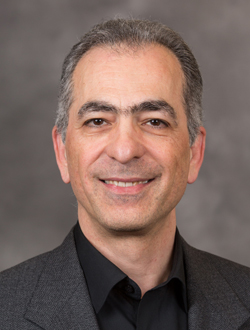Khalil Najafi: First Chair of the new ECE

 Enlarge
Enlarge
Khalil Najafi (BSE MSE PhD EE ’80 ’81 ’86) was the right man at the right time to be the first Chair of the newly organized Electrical and Computer Engineering Division at Michigan. He was a man of ideas and an agent of change. He brought enormous research credibility to the position, combined with an abiding patience and an appreciation for both individuals and teams.
Prof. Najafi was named Chair of ECE in September 2008, just a few months after the new two-division structure was approved by the Regents. He brought stability to the department, which had previously been led by four different Chairs in the previous decade.
As the first Michigan alumnus to become Chair since George Haddad, he knew the department well. Khalil began his career at Michigan as a freshman engineering student in January 1977. He fondly recalled the great classes taught by Prof. Nino Masnari and a few others during his undergraduate years. However, the decade of the 1970’s were often described as the worst any faculty could remember due to lack of funds available for faculty hiring and any other academic improvements. It was a situation the future leader could feel even as an undergraduate student.
By the time he was a graduate student working on solid state sensors and devices under Prof. Ken Wise, things had begun to change for the better. “Duderstadt became Dean, we moved into a new building, there were many new faculty, and there was a lot of enthusiasm,” recalled Najafi. “And it was interesting and exciting to work on devices with many different applications.”
His research with Prof. Wise made Najafi one of the pioneers in the field that would be known years later as microelectromechanical systems (MEMS). By 2017, he had been a worldwide leader for nearly 30 years in the research and development of micromachined sensors, MEMS and integrated microsystems. He has made lasting contributions in several different areas of microsensors, including fabrication and packaging technologies, inertial sensors, energy harvesters, implantable biomedical sensors, and integrated electronics for implantable neural prostheses. He has also accomplished seminal work in MEMS-based power sources.
Najafi also co-founded two companies: Integrated Sensing Systems, Inc. (ISS), a company specializing in the design, development, manufacture and commercialization of innovative MEMS products, and ePack, a MEMS packaging company. He has more than 20 U.S. patents.
During these years, Najafi served as the Director of the Solid-State Electronics Laboratory (1998-2005), as deputy director of the NSF ERC on Wireless Integrated Microsystems (2000-2009), and as director of the NSF National Nanotechnology Infrastructure Network (2004-2014).
He brought all of this experience to his role as Chair of Electrical and Computer Engineering. Some of the changes he brought to the department as of 2017 included:
- Merging of the 2 graduate programs in Electrical Engineering and Electrical Engineering:Systems into one graduate program in Electrical and Computer Engineering
- Hiring 24 new faculty in broad technical areas that cross traditional boundaries, including 7 women faculty.
- Breaking down the internal lab structure into a greater number of technical areas, each with their own Director.
- Greatly expanding alumni outreach by hiring a full time staff person in Alumni Affairs, holding events around the country, and investing in an online mentoring program
- Expanding ECE’s reach into the community by offering summer camps to high school students
- Supporting the cultural diversity of ECE students by offering culturally diverse social events
- Initiating the process of revamping the undergraduate curriculum
“I think it’s good sometimes to go in and changes things,” said Khalil. “In academia I think it’s easy for people to get used to the same structure if they do it all the time. If you get used to doing the same thing all the time, you get resistant to change, and I think that goes against what a university is supposed to be. A university is supposed to be changing all the time.”
The accomplishments of those in leadership are not often recognized with awards. However, in the areas of research and teaching, Prof. Najafi’s achievements have been well recognized. He has received the IEEE Daniel E. Noble Award for Emerging Technologies, the IEEE Sensors Technical Field Award, several best paper awards, and is a Fellow of IEEE and the American Institute for Medical and Biological Engineering (AIMBE).
He has earned several teaching awards at Michigan, including being named Arthur F. Thurnau Professor for outstanding contributions to undergraduate education. He received the U-M Henry Russel Award for outstanding achievement and scholarship, and the U-M Distinguished Faculty Achievement Award for exceptional contributions in scholarship, teaching, and service. He received the Distinguished University Innovator Award in recognition of his development of innovative and transformative technologies.
He was named Schlumberger Professor of Engineering in 2006, and Peter and Evelyn Fuss Chair of Electrical and Computer Engineering in 2015 thanks to an endowment by Peter and Evelyn Fuss.
He received the B.S., M.S., and the Ph.D. degrees in 1980, 1981, and 1986 respectively, all in electrical engineering from the University of Michigan.
Video and Further Reading
 MENU
MENU 
